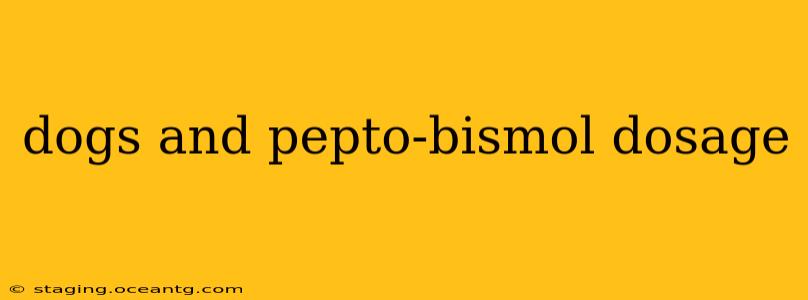Giving your furry friend the wrong medication can be incredibly dangerous. This guide focuses on the crucial topic of Pepto-Bismol dosage for dogs, exploring its uses, risks, and safe alternatives. Never administer any medication to your dog without first consulting your veterinarian. This information is for educational purposes only and should not be considered medical advice.
Is Pepto-Bismol Safe for Dogs?
The short answer is: generally no. While Pepto-Bismol (containing bismuth subsalicylate) might seem like a harmless remedy for human diarrhea, it can be toxic to dogs. The salicylate component in Pepto-Bismol is similar to aspirin, and even small doses can cause serious side effects in dogs, particularly those with pre-existing conditions like kidney or liver disease.
The potential dangers include:
- Gastrointestinal upset: Vomiting, diarrhea, and loss of appetite are common side effects.
- Salicylate toxicity: This can lead to more severe problems, such as bleeding disorders, kidney failure, and even death.
- Interactions with other medications: Pepto-Bismol can interact negatively with other drugs your dog might be taking.
What are the Symptoms of Pepto-Bismol Toxicity in Dogs?
Recognizing the symptoms of Pepto-Bismol poisoning is crucial for prompt veterinary attention. Watch for:
- Vomiting: This is often one of the first signs.
- Diarrhea: Possibly bloody or black in color.
- Loss of appetite: Your dog may refuse food or show little interest in eating.
- Lethargy: Unusual tiredness or lack of energy.
- Tremors: Shaking or trembling.
- Rapid breathing: An increased respiratory rate.
- Weakness: Difficulty standing or walking.
- Jaundice: Yellowing of the skin or eyes (a sign of liver damage).
What Should I Do If My Dog Ingests Pepto-Bismol?
Immediate veterinary attention is paramount. Do not attempt to induce vomiting or administer any home remedies without consulting your vet. Contact your veterinarian or an animal poison control center immediately. They will guide you on the best course of action, which might include inducing vomiting, administering activated charcoal, or providing supportive care depending on the amount ingested and your dog's condition.
What are Safe Alternatives for Dog Diarrhea?
Instead of resorting to human medications, consult your veterinarian about appropriate treatments for your dog's diarrhea. They can determine the underlying cause and recommend safe and effective options, such as:
- Dietary changes: A bland diet can often help settle a dog's stomach.
- Probiotics: These can help restore the balance of good bacteria in the gut.
- Prescription medications: Your vet might prescribe medications to address the underlying cause of the diarrhea or manage symptoms.
Can I Give My Dog Pepto-Bismol for Upset Stomach?
No. The risks significantly outweigh the potential benefits. Always consult your veterinarian before administering any medication to your dog, even seemingly harmless ones. They can provide a safe and effective treatment plan tailored to your dog's specific needs.
How Much Pepto-Bismol is Toxic to Dogs?
Even small amounts of Pepto-Bismol can be toxic to dogs, and the precise toxic dose varies depending on factors like your dog's size, breed, and overall health. The most important thing is to avoid giving your dog any Pepto-Bismol at all.
My Dog Ate Pepto-Bismol, What Now?
This underscores the importance of immediate veterinary consultation. The severity of the situation depends on the quantity ingested and your dog's health. Don't delay; seek professional help at once.
Remember, your veterinarian is your best resource for addressing your dog's health concerns. This information is for general knowledge and should never replace professional veterinary advice. Always prioritize your pet's safety and well-being.
